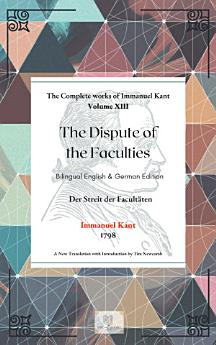The Dispute of the Faculties
Par šo e-grāmatu
This is Volume XIII in the Complete Works of Immanuel Kant by LP.
Dispute of the Faculties is Kant's defense of his religious writings against secular Prussian Lutheran authorities who accused him of a wide range of issues including attempting to wrestle religious power away from Biblical Theologians and corrupting the youth with "unbiblical" concepts. His 1793 Religion within the Limits of Mere Reason, his most theological work, cause a stir among the Prussian censorship authorities. The Prussian state still intervened in academic affairs for its own reasons, and Kants works gained their attention as potentially disruptive. He published only one small lecture on Anthropology after this work before he died. Here and in Faculties, he argues for a pragmatic differentiation between the sciences, humanities, theological and philosophic faculties. The Theological faculties should be focused on pragmatic church issues and not conflict with the philosophers. These are practical conflicts that inevitably arise from the Mind-World and Mind-Body paradoxes, which he elaborates on in the text.








